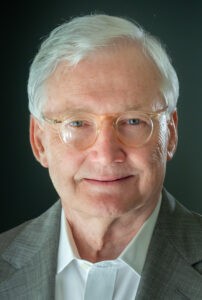The great Rabbi Abraham Heschel, a spiritual genius, suffered a near-fatal heart attack in 1972. A friend came to visit him in his New York City apartment. Heschel said, “Sam, when I regained consciousness, my first feelings were not of despair and anger. I only felt gratitude to God for my life, for every moment I had lived. I was ready to depart.”
Then he said in a weakened whisper, “This is what I meant when I wrote earlier, ‘I did not ask for success; I asked for wonder.’”
His friend Sam later collected some of Heschel’s sayings in a book he titled, I Asked for Wonder. We would ask for that today, every day.
So Heschel lived. In one of his writings he said, “Our goal in life should be to live in radical amazement, to get up in the morning and look at the world in a way that takes nothing for granted. Everything is phenomenal, everything is incredible, never treat life casually.”

Stephen Shoemaker
The world is full of wonders — give us this day, O God, wonderment. The poet Elizabeth Barrett Browning wrote: “Earth’s crammed with heaven, and every common bush afire with God. But only he who sees takes off his shoes. The rest sit around and pluck blackberries.”
Of course, picking blackberries can be filled with wonder too, gathering them, popping the sun-warmed berry into our mouth, its dark red juice running down our chin.
It is the vocation of poets to help us see, to evoke our wonder, to help us take off our shoes.
Any moment can be like that. Eternal. Jesus, who as a boy romped the Galilean hillsides strewn with wildflowers, said to us, Consider (don’t forget) the flowers! Look at the birds! Be astonished.
We may ask, “What keeps us from wonder if we are made for it? If it is part of the feast God has set before us?” And we already know the answers. We live too fast and wear out our eyes. This is what poems do: They slow us down and open our eyes. And artists who create art from oil, pigment and water. But someone said the average time a person looks at a painting in a museum is 11 seconds. That’s how we live our days. And yet, we aren’t average, are we? No one is.
“We might rightly say children have a sense of wonder we teach them out of.”
And here’s an issue: What we fill our minds with. In Alice in Wonderland, the Mock Turtle describes his school and what they learn. In mathematics they teach not addition, division and multiplication, but rather ambition, derision and uglification. It’s hard to escape that classroom today.
We might rightly say children have a sense of wonder we teach them out of. They bend down to pick up every small thing — a twig, a bug, a rock. Their hearts are more given to delight, their faces shine with it. So let’s adjust our curriculum.
Paul rightly urges:
What ever is true,
whatever is honorable,
whatever is just,
whatever is pure,
whatever is lovely,
whatever is gracious,
if there is any excellence,
anything worthy of praise,
think on these things.
The human heart can sometimes hold two things together at the same time, like joy and sorrow, but it can’t hold derision and love at the same time or grievance and gratitude or sarcasm and praise. So Paul’s words are crucial to our spiritual health.
Paul’s prayer in Ephesians is full of wonder:
For this reason (that is, as one swept up in the wonder of grace)
I bow my knees before the Father
from whom every family in heaven and on earth is named,
I pray that according to the riches of God’s glory
that God may grant you to be strengthened in your inner being
with power through the Spirit
and that Christ may dwell in your hearts through faith;
that you being rooted and grounded in love
may have the power to comprehend with all the saints
what is the breadth and length and height and depth,
and to know the love of Christ which surpasses knowledge,
so that you may be filled with the fullness of God.
That is the real business of the church, or the first: Christ dwelling in our hearts through faith, being strengthened in the inner person through the Spirit, contemplating the vastness and wonder of God’s love, being filled with the fulness of God.
“’Awe’ seems an old-fashioned word, but it is essential to our spiritual, physical and mental health.”
I’ve been thinking about awe these days. “Awe” seems an old-fashioned word, but it is essential to our spiritual, physical and mental health. What is awe? One defined it: “The feeling we get in the presence of something vast that challenges our understanding of the world, like looking up at millions of stars.”
O, the vastness, the incomprehensibilty, the smallness of our minds and the greatness of God.
There was an article in The New York Times earlier this year by Hope Reece titled “How A Bit of Awe Can Improve Your Health.” A bit of awe? Maybe we couldn’t stand more than that. It’s like when Moses asked God to see God’s face, and God set him in the cleft of a rock so all he could see was God’s back, his trailing glory.
Awe! There is a sense of overwhelmingness about it.
Dascher Keltner has written a new book titled, Awe: The New Science of Everyday Wonder and How It Can Transform Your Life. He cites research that says awe, like joy, contentment and love, is critical to our well being. Science has identified before six basic emotions —anger, surprise, disgust, enjoyment, fear and sadness — but Keltner’s research identifies awe as another, as “it’s own thing.”
Awe slows down the heart rate, quiets our negative self-talk, the critical voice in our heads. It gets us out of ourselves. And we can develop it. We can create “intentional awe experiences.”
If awe is important, how can we increase its presence in our lives?
Register where and when you have experienced awe. Makea list of them. The birth of a child? Seeing the Grand Canyon? Watching a sunset so vivid and beautiful you want to walk into it? The sometimes frightening beauty of a thunderstorm? Maybe that’s close to what Isaiah felt when he saw the Lord high and lifted up in the temple that day.
From the beginning of our species, religion has been a place to cultivate and respond to awe. In Rudolph Otto’s formative book, The Idea of the Holy, he says religion at its core is our response to what he calls the “numinous,” the realm of divine mystery, the transcendent dimension of life.
“From the beginning of our species, religion has been a place to cultivate and respond to awe.”
He described it with these words: “The feeling of it may at times come sweeping like a gentle tide pervading the mind with a tranquil mood of deepest worship. It may pass over into a more set and lasting attitude of the soul.”
True worship evokes awe, along with the other soul experiences. Sometime music does it. “Holy, holy, holy,” we sing, and sometimes it happens in worship, this holy sense of awe.
Here are some other guidelines to intentional awe experiences:
- Take regular walks outdoors.
- Develop “mindfulness,” a slowing down and paying attention. As one said: “Wherever you are, be there!”
- Focus on the moral beauty of others. Pay attention to the simple acts of goodness you see in others. Learn more about those exceptional people whose goodness has inspired many, our heroes and prophets and saints. As Paul said, “Whatsoever is good, pure lovely, gracious, just keep your minds on these things.”
- Choose the unfamiliar path. Go somewhere you’ve never been before. Open yourself to the new, to the wild in our overly domesticated world.
Where has awe gone in our lives? “A little knowledge is a dangerous thing,” it has been said. A little knowledge can hamper our awe.
There is a song we used to sing as a lullaby to our children:
Twinkle twinkle, little star
How I wonder what you are
Up above the the world so high
Like a diamond in the sky ….
Today’s version might go something like this:
Twinkle, twinkle little star,
I don’t wonder what you are!
Full of gas, light years away,
Listen to what the teachers say.
Twinkle, twinkle, little star,
Twinkle on. I know what you are!
We hear the word “awesome” every day. It means “full of awe.” It means seeing what you’ve never seen before, it means taking a journey outside yourself. It means, as Marcus Borg put it, “going beyond the mind you have.”
A few years back when Muslims in America were under fresh attack, some of us at Grace Baptist in Statesville went to worship with our Muslim friends at Masjid Al-Muminum. When we showed up to worship with them that Friday, they showed us how to remove and store our shoes as we entered the Masjid. That is how they enter — in reverence, in bare feet. There was a weekly Buddhist prayer group that met every Sunday morning at my last church. When I would pass the closed door, shoes would be lined up outside the door. I was always touched to see them. Reverence at hand.
When or where do we take off our shoes?
Stephen Shoemaker serves as pastor of Grace Baptist Church in Statesville, N.C. He served previously as pastor of Myers Park Baptist in Charlotte, N.C.; Broadway Baptist in Fort Worth, Texas, and Crescent Hill Baptist in Louisville, Ky.


